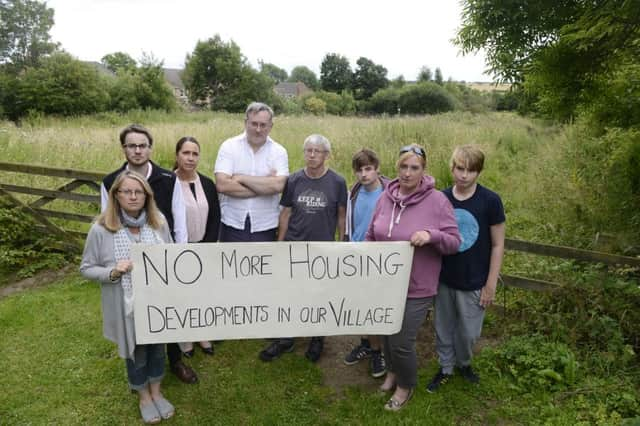How is Northumberland's planning system working?


Since 2010, when the new Government announced its plans to overhaul England’s planning system, there has followed a period of adjustment and change, which has rippled down to the most local level.
Many applications in Northumberland are decided by the planning department at County Hall, but where there are concerns, objections or issues, they will often end up before the councillors in the planning committees.
Advertisement
Hide AdAdvertisement
Hide Ad

But is the planning system working? Do residents’ views matter or is the Government’s agenda over-riding local people in favour of what it sees as ‘the greater good’? Should elected councillors respond solely using the advice on planning law and policy they are provided? Or should they represent their constituents’ views, even if the decision will be overturned on appeal and the council liable for costs?
What makes it even more complicated in Northumberland is that the county’s planning system has changed recently following a highly-critical independent report in early 2015.
At that time, the planning service had been under increasing pressure to improve performance and meet government targets. Failure to do this can result in government intervention and, ultimately, planning decisions being taken out of the council’s hands.
The changes were brought into effect about six months ago and below, we share different views about how the system is working in Northumberland now.


‘Council’s hands are tied by central government’
Advertisement
Hide AdAdvertisement
Hide AdCoun Steven Bridgett is the ward member for Rothbury and was disappointed at the approval of controversial plans for homes either side of Garleigh Road earlier this month, which he believes highlight the issues with the planning system:
“With the changes central government have imposed on local council planning authorities via the National Planning Policy Framework, you now have council planning committees and the councillors that sit on them with no teeth.
“All the councillors that sit on those committees can do is support the planning officers’ recommendations.
“Yes you can ask questions, yes you can debate the issue, but in the end you have to agree with what the planning officers are recommending.
Advertisement
Hide AdAdvertisement
Hide Ad“There is no option to offer an alternative proposal; councillors have been briefed that to do so could result in an appeal by an applicant and, with the Government’s changes to the planning laws, the cost of the appeal could be put on the county council.
“People continually ask me how developers have been able to get planning permission so frequently in areas like Rothbury – well, the simple answer is because the national planning laws laid down by central government permit it.
“In my view, this is only going to get worse with the amendments that the Secretary of State for Communities and Local Government, Greg Clark MP, has attached to the current housing bill.
“If that bill is approved there will be absolutely no need for planning applications to be determined by local councils and locally elected councillors.”
‘Having your say is not getting your way’
Advertisement
Hide AdAdvertisement
Hide AdCoun Gordon Castle, Conservative member for Alnwick, who has served on planning committees for a number of years, says ‘the role of councillors on planning committees is not fully appreciated by some councillors, let alone the public’:
“The NPPF creates a framework to promote and control development; it is broadly in favour of development for economic reasons, but it also explains necessary constraints. Because it is national, these are inevitably high-level directions and contain a strong presumption in favour of development.
“The purpose of the county’s core strategy and of neighbourhood plans is to provide local detail, and because they have not been in place, planning committees have not been able to use this detail. The work on the core strategy is now far enough advanced to start to be relevant, and work has started on many neighbourhood plans which should make a difference.
“Almost 95 per cent of applications are decided by officers under delegated powers, so only the contentious applications get to committee.
Advertisement
Hide AdAdvertisement
Hide Ad“However, developers, like any citizens in this country, can do what they like unless there is a law to prevent them, so we are obliged to weigh up the evidence to determine whether or not planning laws or guidelines have been breached.
“We are not swayed by council planning department targets, but it is true that it would be irresponsible for members to go against an officer recommendation with the full knowledge that an inspector would probably overturn it on appeal. This is not fear of costs, but responsible decision-making.
“However, if we feel strongly enough about an application being clearly wrong we can and should go against officer recommendations, just as we should allow a development to go ahead against officer advice if we believe that the applicant’s case is strong enough. This does happen quite frequently now, but it probably happened too frequently in past years.
“Parishes are frustrated that they cannot now automatically get an application referred to committee, but they can if the reasons for objection are on valid planning grounds that are significant.
Advertisement
Hide AdAdvertisement
Hide Ad“The changes in the planning system have removed their area-based composition, and I do regret that, because it has increased the need for site visits.
“Ultimately, these decisions are fully democratic in that they involve elected members constrained only by planning law and local plans and policies. Members of the public may have their say, but having your say doesn’t mean having your way.
“Most people recognise the need for more housing, but usually want it next to somebody else.
“A common misconceived objection is to claim that there is no need in a particular area, as though that could ever be tested except via the market. It’s up to developers to test markets and sell housing, not the council.
Advertisement
Hide AdAdvertisement
Hide Ad“Finally, accusing developers of greed is emotive and unhelpful. If a profit can’t be made then no houses would ever be built.”
‘Significant improvements have been achieved’
Coun Allan Hepple, part of Northumberland County Council’s Labour administration, is cabinet member responsible for planning:
“The changes that we have made in the last year were essential to improving the planning service and supporting Northumberland and its residents in delivering economic and housing growth.
“They have been in place for six months now and we are currently carrying out a review of the impact of the changes, but early indications are that significant improvements in terms of both the speed and quality of decision-making have been achieved.
Advertisement
Hide AdAdvertisement
Hide Ad“Local councillors and town and parish councils continue to play an important role and we listen carefully to all views on planning applications. At a recent meeting with town and parish representatives, local councillors were complimentary about the changes in the system and described it as more efficient.
“We are in the final stages of producing a core strategy for Northumberland and this together with the potential introduction of regional, as opposed to national, planning policy under the devolution proposal will create a policy framework of direct relevance to Northumberland and the North East. Members of planning committees have to make planning decisions on planning grounds and not doing so can open the council up to challenge, sometimes at a high cost to the taxpayer.
“However, their ability to legitimately challenge officer recommendations has not changed.”
More changes from the top on the horizon with new bill
Just as Northumberland’s core strategy and a number of neighbourhood plans are approaching completion, the Government is making more changes to national policy through its Planning and Housing Bill.
Advertisement
Hide AdAdvertisement
Hide AdA number of measures included in this Bill have caused concerns and have been questioned by opposition politicians.
Clauses 102-103 of the Bill provide a local planning authority with ‘a new duty to keep a register of brownfield land within its area, which would then tie in with a new system of allowing the Secretary of State to grant permission in principle for new development identified on these registers.
‘A developer then wanting to build on an area with permission in principle would then only need to apply for a technical details consent, rather than full planning permission’.
In a report on the committee stage of the Bill, published at the end of December, Shadow Housing Minister Dr Roberta Blackman-Woods asked whether this would apply to any form of development.
Advertisement
Hide AdAdvertisement
Hide AdHousing Minister Brandon Lewis responded to say that the Government’s intention was to limit its use to ‘housing-led’ development, to which Dr Blackman-Woods said that she was ‘still a little anxious about the total scope of developments that could be given permission in principle’.
Labour MP Helen Hayes said there was ‘considerable confusion’ regarding permission in principle and she and other members sought clarification on a number of issues. Perhaps even more controversial is an amendment tabled by Communities Secretary Greg Clark to allow providers other than local planning authorities to ‘process’ planning applications – at the applicant’s request.
It reads: ‘The Secretary of State may by regulations make provision for a planning application that falls to be determined by a specified local planning authority in England to be processed, if the applicant so chooses, not by that authority but by a designated person’. At the Bill’s third reading earlier this month, the proposal was described as being ‘effectively about the privatisation of the planning service’.
Labour MP for Clive Betts continued: ‘Does it mean that an individual or organisation that submits a planning application will be free to shop around for whichever alternative provider they think can give them the best chance of getting a planning application accepted? Will they be able to look at the track record of providers around the country?’
Advertisement
Hide AdAdvertisement
Hide AdConservative Chris Philp responded: ‘I believe the new clause makes it clear that the third-party providers will handle the processing, but not the determination. The new providers will provide speed and efficiency, but decision-making will remain where it currently is – with elected members and officers’. However, once again, concerns were raised about the details and how this would work in practice.